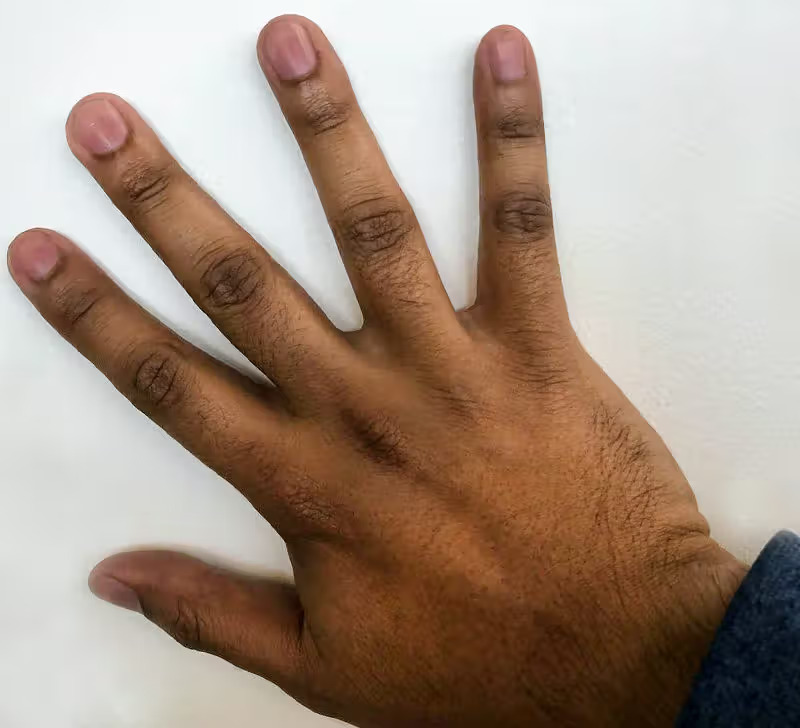Knuckle Check: The 30-Second Test That Could Save Your Life

In a world where we’re constantly told to watch for obvious signs of illness, some subtle indicators might slip under the radar. One such sign that’s gaining attention in the medical community is the appearance of dark knuckles. Far from being a mere cosmetic concern, this seemingly innocuous skin change could be signaling underlying health issues that demand attention.
Dr. Elena Rodriguez, a dermatologist at Stanford University Medical Center, explains, “Dark knuckles, medically termed ‘hyperpigmentation of the knuckles,’ can be a dermatological red flag. While not always indicative of a serious condition, it’s a symptom that shouldn’t be ignored.”
The Science Behind the Shade
The darkening of knuckles occurs due to an increase in melanin, the pigment responsible for skin color. This increase can be triggered by various factors, some benign and others more concerning.
“One of the primary conditions associated with dark knuckles is acanthosis nigricans,” says Dr. James Chen, an endocrinologist at Johns Hopkins University. “This skin condition is often linked to insulin resistance, which can be a precursor to type 2 diabetes.”
Indeed, the connection between dark knuckles and diabetes is one of the most significant. Dr. Chen continues, “In our clinic, we’ve observed that approximately 30% of patients presenting with unexplained knuckle hyperpigmentation were later diagnosed with prediabetes or type 2 diabetes.”
Beyond Diabetes: Other Potential Causes
While the diabetes link is crucial, it’s not the only explanation for dark knuckles. Dr. Rodriguez outlines several other potential causes:
- Addison’s disease: “This rare adrenal gland disorder can cause widespread skin darkening, including the knuckles,” she explains.
- Hormonal imbalances: “Conditions like polycystic ovary syndrome (PCOS) can trigger skin changes, including knuckle darkening.”
- Certain medications: “Some drugs, particularly niacin and birth control pills, may cause skin hyperpigmentation as a side effect.”
- Genetic factors: “In some cases, darker knuckles can be a benign inherited trait, particularly in individuals with darker skin tones.”
Environmental Factors at Play
It’s not all internal, however. Dr. Lisa Garner, a dermatologist and spokesperson for the American Academy of Dermatology, points out that external factors can also contribute to knuckle darkening.
“Prolonged sun exposure can darken the skin on your knuckles, much like a tan,” Dr. Garner states. “Additionally, friction from activities like weightlifting or manual labor can cause localized darkening over time.”
When to Seek Medical Attention
Given the range of potential causes, from benign to more serious, knowing when to consult a healthcare provider is crucial. Dr. Rodriguez advises, “If you notice a sudden darkening of your knuckles, especially if accompanied by other symptoms like unexplained weight changes, increased thirst, or fatigue, it’s time to see a doctor.”
Dr. Chen adds, “Even if it’s the only symptom you’re experiencing, it’s worth getting checked out. Early detection of conditions like diabetes can make a significant difference in long-term health outcomes.”
Diagnosis and Treatment
If you do seek medical attention for dark knuckles, what can you expect? Dr. Garner outlines the typical process:
“First, your doctor will likely perform a thorough physical examination and take a detailed medical history. They may order blood tests to check for diabetes, hormonal imbalances, or other underlying conditions. In some cases, a skin biopsy might be necessary to rule out certain dermatological conditions.”
Treatment, she explains, will depend on the underlying cause. “If it’s related to diabetes or prediabetes, managing blood sugar levels often helps improve skin pigmentation. For hormonal causes, treating the underlying imbalance is key. In cases where it’s purely a skin issue, topical treatments or procedures like chemical peels might be recommended.”
The Bottom Line
While dark knuckles aren’t always a cause for alarm, they serve as a reminder that our skin can offer valuable clues about our overall health. Dr. Rodriguez concludes, “Listen to your skin. It’s not just your body’s largest organ; it’s also one of its most visible diagnostic tools. When it comes to dark knuckles or any unexpected skin changes, it’s always better to err on the side of caution and get it checked out.”
As research continues to unveil the intricate connections between skin manifestations and internal health, paying attention to such subtle changes could prove to be a game-changer in early disease detection and prevention.
Disclaimer: This article is for informational purposes only and does not constitute medical advice. The presence of dark knuckles does not necessarily indicate a health problem, and many cases may be benign. Always consult with a qualified healthcare professional for proper diagnosis and treatment of any medical condition. Do not disregard professional medical advice or delay seeking it because of something you have read in this article.
Heart Disease Prevention: Practical Ways for Diabetic and Hypertensive Individuals






